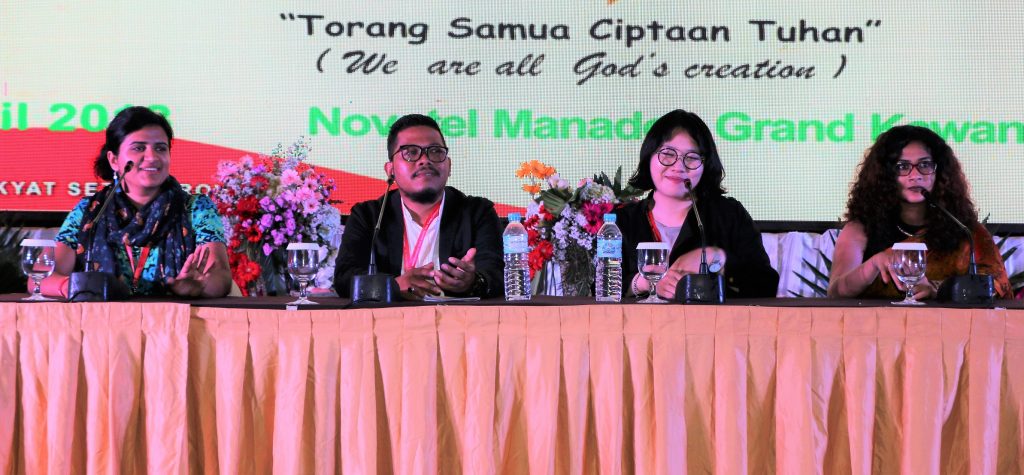Fiery presentations set the stage for panel discussions at the AEYA

The Asian Ecumenical Youth Assembly’s (AEYA) first panel presentation brought together three young leaders who discussed in depth some of the most pertinent issues and concerns affecting Asian young people.
Titled ‘Emerging Issues and Concerns in Asia,’ the three panelists brought to the floor powerful presentations drawn mostly from their own lives and work.
The first speaker, Ruth Mathen, who belongs to the Malankara Orthodox Syrian Church in India, stirred attention and serious discussions from among the participants as she spoke strongly about two issues which she felt needed urgent attention.
“There are two main issues I feel strongly about. The first is that rise of religious fundamentalism and extreme nationalism in India curtails the expressions of Christian faith and identities.”
“The second is about the place and position of women within the church, which places a double burden on those under its ambit,” said 20-year-old Ruth.
She said that the rise of militant and aggressive nationalism was the biggest and most potent threat to any state’s secular nature.
Elaborating on her second point, she said the Greco-Roman culture, which early Church fathers followed were predisposed to misogyny. She further argued that the tradition organised gender relations by principles of hierarchy and subordination.
“We must recognise those rituals of practices and teachings that are firstly patriarchal, value males over females, and take the male as the norm of ‘human’ and defining women as relative dependent and inferior,” she said.
She called for the patriarchal subordination of women in the church to be ‘opposed, resisted and transformed,’ and for women’s position in the church to be viewed as normative and not marginal.
Rev. Jimmy Marcos Immanuel, from the Protestant Church in Western Indonesia, expanded on Ruth’s first point and spoke about religious intolerance, especially in South Asia.
Pointing to some of the recent terror attacks around the world, he said “it not only created deaths, refugees, physical and economical losses, but also intolerance towards religions and religious identities.”
He also proposed that such religious intolerances were often exploited by local political parties to further their political agendas. He argued that development of technology has made it easier for radical and terrorist groups to spread their messages of hate. Over a period of time, they have moved from fighting with guns and bombs to fighting with words and visualisations.
He said that one of the main reasons why youth turned to religious intolerance was economic poverty.
“The growth of youth population, simultaneously accompanied by high rate of unemployment, motivated youth to be more intolerant.”
He said youngsters were also psychologically more vulnerable to get influenced by certain ideologies or thoughts. He pushed today’s youth to not become a generation of ‘job seekers’ and instead show their political roles in societies to counter intolerance movements.
Meanwhile, Kim Minji, a young woman theologian from South Korea, who currently works as a programme coordinator for the National Council of Churches in Korea’s (NCCK) Human Rights Centre, beautifully touched upon how the power of youth could be channeled to make positive changes in society.
She referred to the stories of South Korean protests, popularly known as the ‘Candlelight Struggle,’ which saw the ouster and later imprisonment of South Korean President Park Geun-Hye.
“What triggered the movement was the sinking of the Sewol Ferry, which resulted in the loss of 304 children’s lives. The former president’s inaction, which led to the huge loss of life, galvanised South Korean society like never before. Millions of people attended 20 candlelight vigils,” she said.
She also spoke about work undertaken by the churches in furthering the idea of a peaceful re-unification of North and South Koreas. She ended her presentation by challenging the Asian youth to reach out to each other and communicate more.
“Asian youth should try to be interested in each other's issues and pains and that is the way forward to re-establish the dream of the Asian Ecumenical Movement.”
A series of panel presentations are set to transpire in the next few days of the AEYA, which aims to actively engage the young people in the most pertinent issues in Asia and their imperatives to the Christian faith.
Anu Priya Anand from Australia chaired the session.










